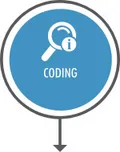The Corona pandemic and the distance learning have brought the importance of parents to their children's school success into the public eye. But also independently of this, studies show that students' family backgrounds can have a direct impact on their performance. Our research synthesis systematically examined the extent to which different forms of parental involvement can promote school success for all students.
Research Questions
- To what extent is parental involvement related to students' academic achievement and motivation?
- To what extent do the relationships between parental involvement and school success (i.e., school performance and motivation) differ by student characteristics (i.e., age, socioeconomic status, and migration background)?
Results
Our research synthesis on parental involvement in the school context shows:
- Parents' educational expectations are strongly related to the performance of the students.
- Parental involvement in committees such as the parent council can have positive effects on school performance.
- The establishment of a suitable learning space at home seems to be significant for the motivation of the students.
- Homework support should not consist of pure control.
Täschner, J., Holzberger, D. & Hillmayr, D. (2021). Elternbeteiligung als Potenzial zur Förderung des schulischen Erfolgs. Ein Second-Order-Review. Die Deutsche Schule, 3, 302–317. https://doi.org/10.31244/dds.2021.03.05
Holzberger, D., Täschner, J. & Hillmayr, D. (2023). Unterschiede im Zusammenhang zwischen Elternbeteiligung und schulischem Erfolg: Ein systematischer Überblick über bestehende Metaanalysen. Zeitschrift für Erziehungswissenschaften. https://doi.org/10.1007/s11618-022-01137-5

Literature Search
For the literature search, we first defined keywords covering the three thematic aspects of school success, parental involvement, and research synthesis. To include international studies, we also used several international databases, each considering different areas of focus in the social sciences.

The keyword search in the databases used yielded a total of 1658 hits, the abstracts of which we screened and reviewed in the course of inclusion and exclusion coding. In order be considered for our research synthesis, the studies had to meet certain criteria:
-
They had to be research syntheses (specifically, meta-analyses).
-
The nature of parental involvement had to relate to the school context.
-
The object of study had to be some form of school success, i.e., school performance or motivation, as a function of parental involvement.

Fine coding was performed by two research assistants at the Centre of International Student Assessment, who extracted the information relevant to our research synthesis from the researched studies and objectively assessed it. In each case, they consulted the full articles in which the studies were published. In this step, we still excluded studies that did not meet our inclusion criteria upon closer inspection. This was the case, for example, if there was no information on the definition of parental involvement or if the study was a research synthesis but not a meta-analysis. Finally, a selection of 18 meta-analyses formed the basis for our research synthesis (second-order review).

